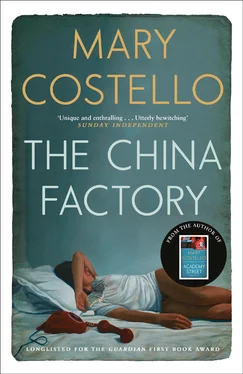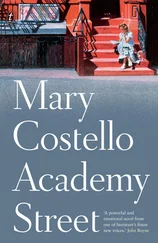His room is small and cramped. He has a large drawing board with compasses and squares and pencils lying in the well at the bottom. It takes up most of the space so that he is forced to the edge. Some nights he comes up here to work and he draws the curtains and switches on a lamp, throwing sharp light on the paper. Outside the street is always quiet, with the neighbours all enclosed behind walls. He sharpens his pencils — he is eager, optimistic, then. He rolls up his sleeves, his head teeming with ideas. Then at the very point of commencement he loses momentum and his plans slip from him and he stands looking down at the paper without a thought.
He opens the window and leans out to look at the girls. They have the garden hose out and when they see him, Rachel, the eldest, aims the jet of water up at him and they both squeal. He tells her to water the plants in the border. A neighbour up the street is mowing grass, over and back, starting and stopping. He thinks of the tiny spindles of grass flying out from the blades. Rachel is struggling with the hose. She is serious about her chores. He tells her to straighten the twist and when she does so the water shoots out at her sister. He likes to watch them. Sometimes he wishes they would fall over lightly so that he could comfort them. There is always some hesitation in him. Ann is easier with them, she knows what to do. When he drives into the street some evenings she is on the footpath dragging toys and bicycles and children back towards the house.
Ann comes out of the house now with Ian, fat and placid, in his pushchair. She is going to Saturday evening Mass. She looks up at him and squints. ‘Do you want to come?’
He makes a doubtful face. ‘What about the girls?’
‘They’ll come if you do. We’ll only be half an hour.’
He shrugs and she says, ‘Okay, Okay.’ He watches her go out the drive and along the footpath. She is tall and slim and wears a green dress with small flowers, and white sandals, and, for a moment, there is nothing in her back that he recognises. She belongs to the street more than to him, to the milling and spilling of children and neighbours and gardens. She slows, checks her watch, then quickens her pace down the street.
He goes downstairs and takes a can of beer from the fridge and stands drinking it at the kitchen window. She has asked him to mow the grass. He will have to cross the garden and lift out the mower from the shed. He imagines revving it up and turning it onto the lawn, like an assault weapon. Unseen things, worms and snails, will be mown. He remembers the neighbour’s grass and the thought of its dispersal grieves him. He goes into the living room and switches on the television and zaps it to mute. He glances at the clock on the mantelpiece every twenty or thirty seconds. In an hour or two the light will fade. He knows already — it is a feeling he gets — that tonight will be sleepless. It is worse in summer. The stillness of summer nights unnerves him. He fears he will stumble on something. He thinks he could sleep through a storm, that his sleeping self would sense the elements fully at play, fully occupied, leaving him free to fall into deep forgetful sleep. On quiet nights everything is singled out under the moonlight, and he sits ambushed and conspicuous in the middle of it all, and it is this visibility, this awareness, that causes his sleeplessness.
He lies on the couch and drifts off. He awakes to the sound of Ann’s key in the front door and the girls’ chatter in the hall. She will feed the children and put them to bed and then they will sit side by side on the couch and watch TV and eat supper in silence.
For over an hour he has lain awake listening to Ann’s breathing. His thoughts are profuse tonight. There is expectation in his body. He gets up and goes into the study. He is reminded of Monday morning, the office, the endless cycle of work and home and long nights. It will go on and on. He goes downstairs to the living room and flicks through the TV channels. He finds a foreign film with subtitles. A man is walking along a beach at dusk. A boy on a horse passes him. The man walks to the end of the beach, then over rocks until he runs out of land.
He sits back with his arms folded across his chest. He remembers the dead horsefly on the windowsill of his study. He came upon it earlier, its legs in the air, its thin wafery wings lying flat. The heat of the sun will dry its body outright. He thought he could smell its deadness, and the smell of warm dust that never leaves that room. Some nights he thinks it’s his own dust that he smells, that specks of him rest on the shelves and the windowsill and on the spines of books. He thinks that he is atomising particle by particle, and he is getting a preview of his own dissolution each night.
He lights a cigarette and inhales deeply. Before it is finished he flicks it into the fireplace and returns to the study. In the rooms around him Ann and the children sleep. He can hardly remember a time before this life, this house, this marriage. They have all toppled in on him. He remembers a moment from school years before. Something funny had made him laugh in science class and he could not stop and the teacher, a young woman named Pearl, grew angrier and angrier. The angrier she grew the more he laughed. And then, without warning, she raised the textbook she was holding and brought it down on his head. Thwack, thwack, thwack . And he laughed on. He looks around the office some days, at his colleagues, searching for telltale signs in them, of some slippage in their lives. There are days when he feels they are all watching him, waiting for the breach. He puts his head in his hands. Lately it has hit him. All new worlds of possibility have closed off, utterly. He fears a loss of faculties. He thinks he has already lost some foresight or insight. He knows it is happening and that he is beginning to shed, and that the dust particles are visible only to him.
‘Andrew?’ Ann is standing at the door.
She sits in the armchair opposite him.
‘Why are you up?’ he asks.
She shrugs and curls her feet up under her. Suddenly he likes having her there. A soft hope spreads over him. He has an image of the two of them at the kitchen table, talking, drinking tea, until the sun’s rays break over the back wall.
‘You need to see someone,’ she says.
He shakes his head. ‘More pills, more Prozac — no thanks!’
‘You’re worrying too much. Why are you worrying?’ Her voice is full of mercy.
He looks at her and considers something. ‘You remember Brian Sinnott? From the tennis club?’
She shakes her head and yawns.
‘Pete knew him from way back. We used to play him and his friend sometimes, go for a drink afterwards. He was a bank manager in town. He was a nice guy— is a nice guy, he’s married with a couple of kids. ‘
‘What about him?’
‘He lost his job.’
‘God. What happened?’
‘Fingers in the till.’
‘You’re joking!’
‘The bank is going to take a case.’
‘Jesus… Why do people do that? How old was he? What kind of guy?’
‘Dead normal. Mid-forties. Just… flipped.’
‘God… his poor wife.’
The landing light is shining into the room. Her skin is pale. She was always beautiful. He wonders what she thinks about, if she harbours secret thoughts, unspeakable yearnings.
‘We should talk more,’ she says.
‘What d’you want to talk about?’
‘I don’t know… Tell me what you think about. Tell me what you do here at night.’
He presses the heels of his palms into his eyes.
‘I work,’ he says. ‘Sometimes I read.’ He glances at the bookshelf. ‘I walk around the house and check the kids. Some nights I look at you.’ She looks down at her hands. ‘Other nights I leave the house, drive around.’
Читать дальше












